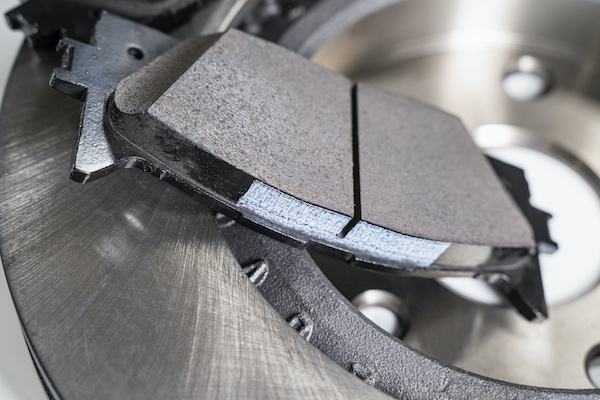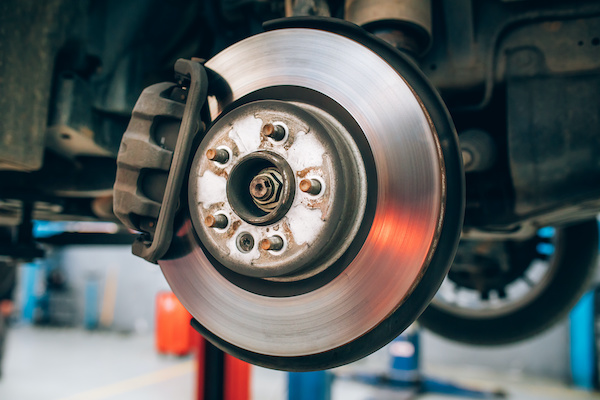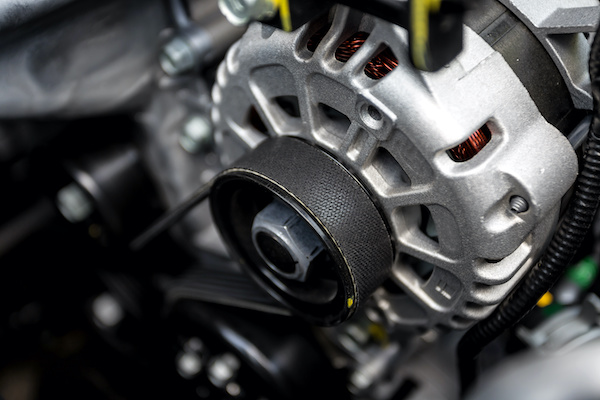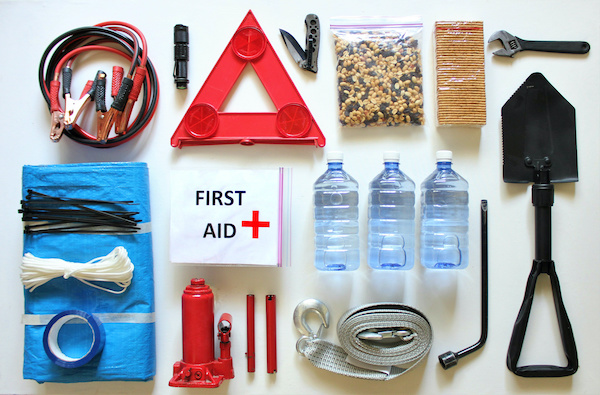Posted on 12/15/2020

Road safety and well maintained braking systems go hand in hand. Break failure can cause catastrophic road accidents. Regular brake checks, maintenance and repair, is vital to ensure they function correctly. As an essential car component, there have been significant improvements in the braking system over the years with the development of new technologies that have made advancements in the braking system possible. The most prominent types of brakes are drum and disc brakes, which differ significantly. Brake Drums Although drum brakes still exist in some vehicles today, they were an older version of brakes that features a simple design with low manufacturing costs. They were mainly made from cast iron and functioned by forcing the two arched shoes placed within the drum. Whenever the driver depresses the brake pedal, pressed brake fluid is forced into the drum brake constraining the pistons to press against the drum sides. The friction results in slow spinning of the wheels and even ... read more
Posted on 11/27/2020

Brake pads create the necessary friction and force to stop your vehicle. Their maintenance is an integral part of handling, drivability, and safety. Over time, heat and friction can wear the brake pads. In some cases, the brake pads can wear at different rates depending on the environment and your driving habits. If your commute has a lot of city driving, you'll use the brakes more frequently than freeway driving. However, braking at high speeds can wear the brake pads exponentially faster than at lower speeds. Brake wear is also dependent on the type of vehicle you drive, but you can do techniques to get the most out of your brake pads. Below are three tips to implement to increase the lifespan this winter. Lighten the amount of weight you carry in your vehicle. Excess weight will cause you to press harder on the pedal to slow down the same distance if there wasn't additional weight. Increase your stopping distance. Harsh braking that is har ... read more
Posted on 10/23/2020

The alternator plays a vital role in the electrical systems within your vehicle. It turns the energy from within the crankshaft into electricity that your car needs to power the battery and other essential parts of the electrical system. In ideal conditions, the alternator can last 7-10 years. If the alternator does begin to wear, various other electrical components also start to fail. While the alternator can fail randomly, some drivers notice minor vehicle issues happening overtime. If you suspect your alternator is beginning to fail, below are five common symptoms that indicate a problem is on the rise: • Battery Indicator Light The battery light will illuminate on the dashboard or the letters ALT if the alternator is giving out. This can alert you that there are electrical issues that need your attention. • The Battery is Weak If the alternator can’t charge the battery, the battery will be weak and inconsistent. One ... read more
Posted on 9/24/2020

Drivers aren’t just keeping their vehicles for several years; they’re driving more miles in a shorter period of time. Cars are expensive, and not every individual can purchase a new one once it hits over 100,000 miles. Today, it’s about protecting your investment. While modern vehicles are built more sturdily, they still need consistent servicing to optimize performance. Once a car enters the high mileage club, constant vehicle maintenance helps increase longevity, handling, and fuel efficiency. Below are a few tips to keep your high mileage vehicle running several thousand miles long. Stay consistent with the owner’s manual recommended services. Vehicles need regular checkups just as we do. A tune-up is a perfect time to have an inspection to ensure that everything is running smoothly and efficiently. Tune-ups also catch any issues before they lead to costly repairs. Get Regular Car Washes. Keeping your vehicle clean inside a ... read more
Posted on 8/31/2020

Learning how to drive is a great step towards independence. While it’s exciting to learn, it can get very intimidating when other vehicles speed off near you and cut you off on the road. The trick to being a good driver is being a comfortable driver. When you’re comfortable, you’re confident. Becoming comfortable takes time and practice behind the wheel. Below are a few helpful tips for the new driver on the road: Stay Distraction-Free. After you put your seatbelt on and start your car, make sure you have a clear idea of your route or destination. If you aren’t sure, have your GPS on and ready. Make a habit out of ensuring everything in the vehicle is adequately stored and strapped in, so nothing falls during the trip. Also, make sure your ringer is off. Most newer cars come with Bluetooth capabilities, but you shouldn’t be taking any calls at this point as a new driver. Make Adjustments Before Hitting the Road. Before d ... read more
Posted on 7/31/2020
They say dogs are a man’s best friend, so what better way to spend your free time than a road trip with your furry pal. For some dogs, a road trip is a joyful experience, while for others, it may leave them nervous and tense. Some dogs even get nauseated and car sick. To ensure your road trip will be a fun and stress-free experience for you and your pup, you should follow a few tips. Below are some suggestions for making your drive safe and enjoyable for your dog: What types of drives is your dog used to? The trips your dog takes should be varied. If you only drive your pup to the doctor to get shots, car rides can be nerve-wracking. Help your pup associate car rides with a pleasant experience like play dates, dog parks, or puppy spas. Make road trips an enjoyable experience for your pup. Make sure you pack your dog’s essentials. Before starting your trip, make sure you have bags for poop, water, bowl, treats, safety harness, crate, etc. You should be ... read more
Posted on 6/30/2020
Modern vehicles have a variety of accessories that come standard in most vehicles. Seat belts, seat warmers, and air conditions were not always included in cars in the past. Most of these features have just recently become the new norm. One addition that was most recently standardized within the last few decades is the side mirror. For most of the 20th century, side-view mirrors were not the norm, but an optional add-on feature for new cars. This may come as a surprise becomes one of the first lessons we learn in Driver’s Ed is to check your side mirrors and glance over your shoulder before switching lanes. For the first half of the 20th century, many roads only consisted of two lanes, with each lane headed in the opposite direction. Therefore, design and safety requirements depended on the regulations during the period a vehicle was manufactured. Vehicles consisted of only the features that lawmakers deemed necessary. Since most roads were only one lane at the time, there weren ... read more
Posted on 5/29/2020

While many of us get into our cars each day and expect to get to our destination without trouble, unexpected things can happen. Whenever you use your vehicle, being as prepared as possible is the single best way to handle a variety of different types of situations. Whether you hit some bad weather, get a flat tire, or are involved in a minor vehicle collision, having emergency items on hand when you need them can make a huge difference! We know that emergency or unexpected situations on the road can be scary, but this is why being as prepared as possible can help aid you in these instances and take away some of the stress that comes with having to deal with an unexpected situation. We recommend having the following 10 emergency items on hand in your vehicle at all times: A spare tire, jack and a lug wrench to change a flat tire. A flashlight in case you need light in the dark to change a tire or check out something on your vehicle. A small tool kit to ha ... read more
Posted on 4/30/2020
We understand that it can be a little bit stressful when thinking about going to the auto repair shop. However, the most important thing to remember is that you are in charge of your own vehicle, and that you can ask as many questions as you would like about your car and any recommended services. Here are some suggestions on what to ask your mechanic when you visit the shop: Are your mechanics licensed? - It is always a good idea to ask if the shop’s mechanics are licensed or certified. This will give you peace of mind that the staff working on your vehicle know what they are doing. What exactly is wrong with my vehicle? - Don’t be afraid to ask for details about what is actually wrong with your vehicle. This will give you the opportunity to understand the repair and do more research yourself. How much will this cost me? - Don’t be afraid to ask for an estimate of any work that the shop is recomm ... read more
Posted on 3/30/2020

At University Chevron, we want you to know that we remain open and here for all of your automotive needs during this difficult time. We are closely monitoring CDC updates regarding the virus and understand the severity of this matter. Auto repair is considered an essential service, and we understand the importance of staying open to be available to service you with reliable auto care when you need it. Whether you need your vehicle to get to work, go to the store, or get medical care - a reliable car is extremely vital at this time. If you find yourself dealing with car trouble or need a service completed, you can count on University Chevron to assist and get you back on the road. We want to do our part to help prevent the spread of COVID-19, and have implemented new measures to ensure the safety of both our customers and our employees. Those measures include the following: Sanitizing your vehicle's keys and high-touch services upon entry and exit Stepping ... read more